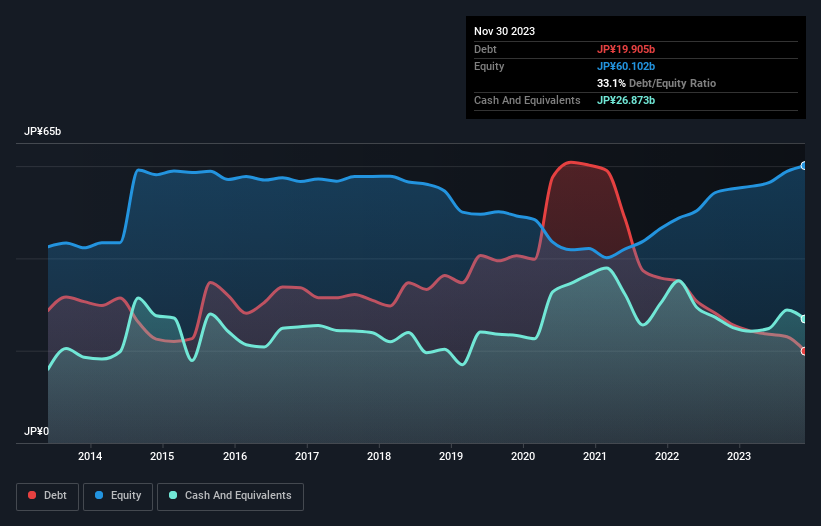
Warren Buffett famously said, 'Volatility is far from synonymous with risk.' So it might be obvious that you need to consider debt, when you think about how risky any given stock is, because too much debt can sink a company. We can see that Yoshinoya Holdings Co., Ltd. (TSE:9861) does use debt in its business. But the more important question is: how much risk is that debt creating?
Why Does Debt Bring Risk?
Generally speaking, debt only becomes a real problem when a company can't easily pay it off, either by raising capital or with its own cash flow. Ultimately, if the company can't fulfill its legal obligations to repay debt, shareholders could walk away with nothing. However, a more common (but still painful) scenario is that it has to raise new equity capital at a low price, thus permanently diluting shareholders. Of course, debt can be an important tool in businesses, particularly capital heavy businesses. The first step when considering a company's debt levels is to consider its cash and debt together.
Check out our latest analysis for Yoshinoya Holdings
What Is Yoshinoya Holdings's Debt?
You can click the graphic below for the historical numbers, but it shows that Yoshinoya Holdings had JP¥19.9b of debt in November 2023, down from JP¥25.6b, one year before. But it also has JP¥26.9b in cash to offset that, meaning it has JP¥6.97b net cash.

How Healthy Is Yoshinoya Holdings' Balance Sheet?
We can see from the most recent balance sheet that Yoshinoya Holdings had liabilities of JP¥30.5b falling due within a year, and liabilities of JP¥22.6b due beyond that. Offsetting these obligations, it had cash of JP¥26.9b as well as receivables valued at JP¥5.73b due within 12 months. So it has liabilities totalling JP¥20.5b more than its cash and near-term receivables, combined.
Of course, Yoshinoya Holdings has a market capitalization of JP¥214.9b, so these liabilities are probably manageable. But there are sufficient liabilities that we would certainly recommend shareholders continue to monitor the balance sheet, going forward. While it does have liabilities worth noting, Yoshinoya Holdings also has more cash than debt, so we're pretty confident it can manage its debt safely.
Even more impressive was the fact that Yoshinoya Holdings grew its EBIT by 158% over twelve months. If maintained that growth will make the debt even more manageable in the years ahead. When analysing debt levels, the balance sheet is the obvious place to start. But ultimately the future profitability of the business will decide if Yoshinoya Holdings can strengthen its balance sheet over time. So if you want to see what the professionals think, you might find this free report on analyst profit forecasts to be interesting.
But our final consideration is also important, because a company cannot pay debt with paper profits; it needs cold hard cash. Yoshinoya Holdings may have net cash on the balance sheet, but it is still interesting to look at how well the business converts its earnings before interest and tax (EBIT) to free cash flow, because that will influence both its need for, and its capacity to manage debt. Over the last three years, Yoshinoya Holdings actually produced more free cash flow than EBIT. There's nothing better than incoming cash when it comes to staying in your lenders' good graces.
Summing Up
We could understand if investors are concerned about Yoshinoya Holdings's liabilities, but we can be reassured by the fact it has has net cash of JP¥6.97b. The cherry on top was that in converted 263% of that EBIT to free cash flow, bringing in JP¥8.2b. So we don't think Yoshinoya Holdings's use of debt is risky. When analysing debt levels, the balance sheet is the obvious place to start. However, not all investment risk resides within the balance sheet - far from it. To that end, you should be aware of the 1 warning sign we've spotted with Yoshinoya Holdings .
If, after all that, you're more interested in a fast growing company with a rock-solid balance sheet, then check out our list of net cash growth stocks without delay.
If you're looking to trade Yoshinoya Holdings, open an account with the lowest-cost platform trusted by professionals, Interactive Brokers.
With clients in over 200 countries and territories, and access to 160 markets, IBKR lets you trade stocks, options, futures, forex, bonds and funds from a single integrated account.
Enjoy no hidden fees, no account minimums, and FX conversion rates as low as 0.03%, far better than what most brokers offer.
Sponsored ContentNew: Manage All Your Stock Portfolios in One Place
We've created the ultimate portfolio companion for stock investors, and it's free.
• Connect an unlimited number of Portfolios and see your total in one currency
• Be alerted to new Warning Signs or Risks via email or mobile
• Track the Fair Value of your stocks
Have feedback on this article? Concerned about the content? Get in touch with us directly. Alternatively, email editorial-team (at) simplywallst.com.
This article by Simply Wall St is general in nature. We provide commentary based on historical data and analyst forecasts only using an unbiased methodology and our articles are not intended to be financial advice. It does not constitute a recommendation to buy or sell any stock, and does not take account of your objectives, or your financial situation. We aim to bring you long-term focused analysis driven by fundamental data. Note that our analysis may not factor in the latest price-sensitive company announcements or qualitative material. Simply Wall St has no position in any stocks mentioned.
About TSE:9861
Yoshinoya Holdings
Through its subsidiaries, owns and operates restaurants worldwide.
Flawless balance sheet with limited growth.


